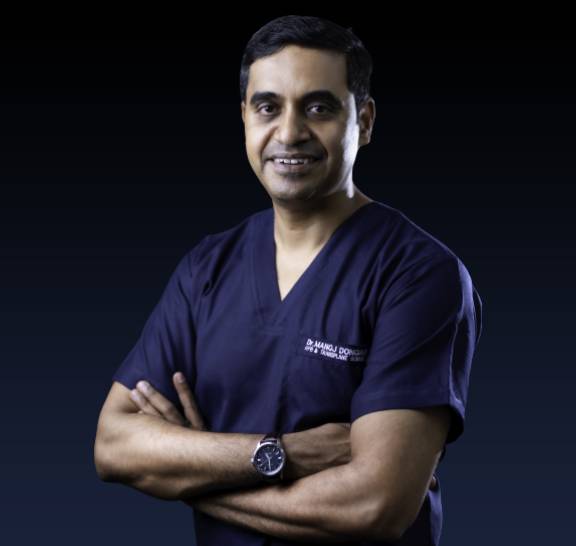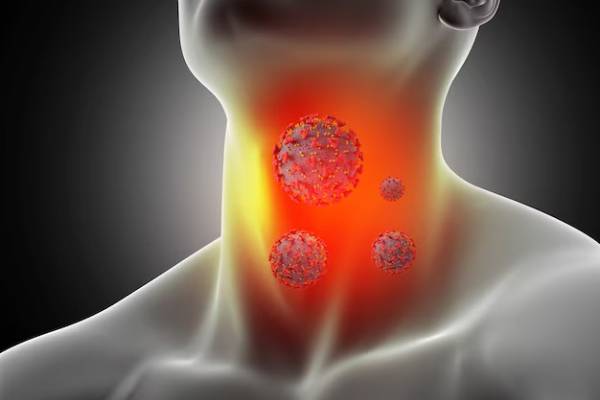
Are You Searching Thyroid Cancer hospital, thyroid cancer doctor, thyroid cancer treatment in Pune, thyroid cancer specialist, and thyroid cancer center in Wakad, PCMC, Pune provide standard quality treatments and have experienced Cancer specialists.
Dr. Manoj Dongare is one of the most experienced and qualified Cancer Specialists in PCMC, Pune, with more than 16 years of experience in treating various types of cancers. He has expertise in various cancer surgeries, including breast, lung, gynecological, bladder, oral, and gastrointestinal (GI) cancers. He is one of the very few GI & HPB (Hepato-Pancreato-Biliary) Surgical Oncologists in Pune, making him highly skilled in treating complex cancers.
Currently, Dr. Manoj Dongare is working as an Assistant Professor and Consultant Surgical Oncologist at Pune’s prestigious Dr. DY Patil Hospital and Research Center in Pimpri. His expertise in cancer surgery, coupled with his patient-centered approach, makes him one of the best cancer specialists in Pune and Thyroid Cancer Treatment in Pune.

What is Thyroid Cancer?
Thyroid cancer forms in your thyroid, a small, butterfly-shaped gland at the base of your neck. This gland makes hormones that control your metabolism (how your body uses energy). Thyroid hormones also help control your body temperature, blood pressure, and heart rate. Thyroid cancer, a type of endocrine cancer, is typically highly treatable, with an excellent cure rate.
Dr. Manoj Dongare is one of the best Thyroid cancer specialists in Pune which handles every case with utmost care.
Thyroid Tumors:
Thyroid cancer starts when healthy cells in the thyroid change and grow out of control, forming a mass called a tumor. The thyroid organ contains 2 kinds of cells:
- Follicular cells are responsible for the production of thyroid hormone. Thyroid hormone controls the basic metabolism of the body. It controls how quickly calories are burned. This can impact weight loss, weight gain, how fast the heart beats, body temperature, how quickly food moves through the digestive tract, how muscles contract, and how quickly dying cells are replaced. Thyroid hormone is an important hormone for many body parts and the body needs it to survive.
- C cells are unique thyroid cells that make calcitonin, a hormone implicated in calcium metabolism.
A tumor can be cancerous or benign. A cancerous tumor is malignant, meaning it can grow and extend to other parts of the body. A soft tumor means the tumor can grow but will not spread. Thyroid tumors can also be called nodules, and about 90% of all thyroid nodules are benign.
What are the symptoms of thyroid cancer?
Dr. Manoj Dongare explains most thyroid cancers do not produce any symptoms. However, if large enough (and this is different for everyone), it may cause:
- A lump on the front of the neck should be evaluated by an endocrine specialist.
- Observable protrusion (lump or bump) in the neck
- Pressure in the front of the neck
- Difficulty or uncomfortable swallowing
- Problems breathing when lying flat
- A new persistent cough
- A change in your voice (though rarely)
- Differences in thyroid hormone production and endocrine balance in the body
Risk factors for thyroid cancer:
A risk factor signifies that a person with certain features or medical history may have a greater chance of getting a specific disease. Some risk elements can be changed, while others cannot. But just because you have one or several risk factors doesn’t mean you will inevitably get the illness they are associated with.
Risk factors associated with thyroid cancer can include:
- being a woman
- having a family history of thyroid cancer
- having a genetic condition, such as Cowden disease or familial adenomatous polyposis
- being overexposed to radiation in childhood, such as through X-rays or radiation therapy
- being overexposed to pesticides
- being overweight or having obesity
Diagnosis of thyroid cancer:
Tests to diagnose thyroid cancer may include:
- Blood tests: A blood test will check the levels of hormones (including T3 and T4) and the thyroid-stimulating hormone (TSH). A blood test can also help to determine non-cancerous thyroid disorders, such as hypothyroidism (underactive thyroid) or hyperthyroidism (overactive thyroid).
- Ultrasound: A painless scan takes about 20 minutes, an ultrasound produces pictures of internal organs. It can assist in determining if any lump in your neck is solid or fluid-filled. It will also show whether any lymph nodes have been impacted.
- Biopsy: A Cancer Specialist removes some of the thyroid tissue for examination under a microscope. The most typical type of biopsy is called a fine needed aspiration, alternatively, Dr. Dongare may do a hemithyroidectomy to remove a tissue sample.
- Radioisotope scan: This trial is usually done if blood tests suggest an overactive thyroid (hyperthyroidism). A small amount of radioactive liquid (such as iodine) is infiltrated into a vein in your arm before a gamma camera scan is done. The amount of radioactive fluid taken up by the thyroid gland is then counted.
- Other scans: If cancer is detected in your thyroid, you may have other scans to see if cancer has spread to other parts of your body, such as a CT, MRI, or PET scan.
Ask your cancer specialist to explain treatment options and any potential side effects and financial concerns. Take as much time as you can so that you can make well-informed decisions.
Treatment for thyroid cancer:
Therapy of Thyroid cancer depends on a variety of elements. It includes:
- Palliative care: In some chances of thyroid cancer, Dr. Dongare may speak to you about palliative care. Palliative care seeks to improve your quality of life by alleviating signs of cancer. As well as slowing the spread of thyroid cancer, palliative therapy can reduce pain and help manage other signs. Treatment may include radiotherapy, chemotherapy, or other drug therapies.
- Surgery: The most typical form of therapy is surgery, whereby a section or the whole thyroid gland is removed (partial or total thyroidectomy). As a preventive measure, the surgeon may also remove nearby lymph nodes (called a neck dissection).
- T4 therapy: Thyroid hormone alternate therapy is given as a daily tablet to replace the thyroid hormones (thyroxine or T4) that your body can no longer deliver after surgery. If you have had thyroid surgery you will need Thyroxine replacement for the rest of your life as it is very important to keep your body working at a normal healthy rate.
- Radioactive iodine treatment: A form of inner radiation therapy, radioactive iodine therapy is typically taken in a gel tablet form. It kills any cancer cells left behind after surgery. Talk to a cancer surgeon about the safety measures needed for this type of therapy.
- Radiation therapy (radiotherapy): External radiation therapy (the use of high-energy X-rays) may be given after surgery, particularly if cancer has spread to lymph nodes in the neck, or for thyroid cancers that are less responsive to radioactive iodine therapy (such as medullary or anaplastic thyroid cancers).
- Chemotherapy: Chemotherapy is occasionally used to treat thyroid cancer that is not responding to radioactive iodine therapy. It is usually given as a medicine that is injected into a vein (intravenously).
What is the cost of Thyroid cancer Treatment in Pune?
The average cost of Thyroid cancer treatment in Pune is approximately Rs. 70000 to 95000. Also, the cost may vary depending
- Type of treatment recommended by Thyroid Cancer Surgeon
- Duration of hospitalization
- Room category
- Additional medical tests, if required
- Expense for medications
- Government Scheme (If Applicable)
Why Choose Dr. Manoj Dongare for Thyroid Cancer Treatment?
- Extensive Experience: With over 16 years of experience, Dr. Dongare has performed more than 2000 cancer surgeries, 600 liver transplants, and 300 pancreatic resections.
- Expert Qualifications: He obtained his MBBS from BJ Medical College, Pune, and completed his MS (General Surgery) at Grant Medical College, Mumbai. He then underwent a rigorous 3-year Surgical Oncology Residency at Tata Memorial Hospital, Mumbai.
- Comprehensive Care: Dr. Dongare’s approach involves personalized treatment plans tailored to each patient’s specific needs, ensuring the highest standard of care.
- Research and Awareness: His ongoing objective is to reach underdeveloped areas of the country to spread awareness about cancer and its treatment.
Don’t let thyroid problems impact your quality of life. See Dr. Manoj Dongare and take the first step toward effective thyroid cancer treatment.
Book an Appointment:
Dr. Manoj Dongare at Dr. D. Y. Patil Hospital and Research Center provides the best treatment for various Thyroid diseases in Pimpri Chinchwad Pune. For more information about our comprehensive treatment options, or to request an appointment with the Best Cancer Treatment in Pune call 09881379573 or Click on Book Appointment for online booking with your nearest hospital.
